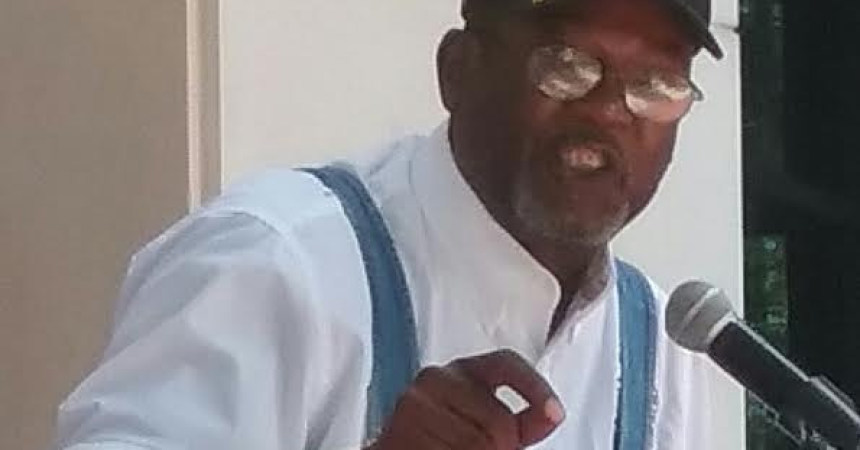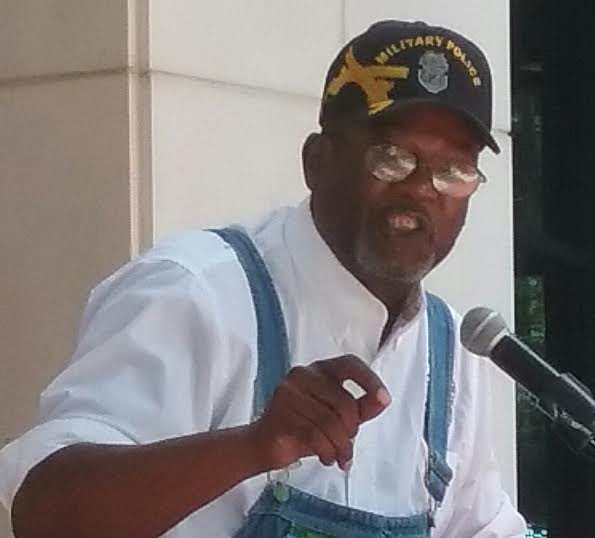
Local NAACP president calls for law to oversee police

Dale Landry, president of the Tallahassee branch of the NAACP, makes an appeal for laws that would oversee police action.
Photo by St. Clair Murraine
By St. Clair Murraine
Outlook writer
While the volume is getting louder on dialogue about how to stem apparent retaliations over police-involved shootings that took the lives of Black men, lawmakers should take a closer look at the Declaration of Independence for some answers, the president of the Tallahassee chapter of the NAACP said.
Dale Landry also said laws that give law enforcement officers the right to use force that could be deadly should include guarantees so that police officers who use questionable deadly force would not be allowed to retain their jobs. He would beseech the NAACP to push for a referendum to remove officers who have been involved in cases such as those that have rocked the country in recent weeks.
Laws that give police officers a right that could mean taking a human’s life contradict the Declaration of Independence, Landry said.
“Imbedded in it, we talk about life, liberty and the fundamental unalienable right that this democracy was built on,” he said. “Based on that, the government’s job is to protect life, liberty and the pursuit of happiness of the individual.”
Effort to get a law that takes an officer involved in an unnecessary fatal shooting off the police force should begin with a grass root movement, Landry said.
Police-involved shootings that took the lives of Alton Sterling in Baton Rouge, La., and Philando Castile in Minnesota set off a firestorm of protests across the country. Two days after the Minnesota incident, five Dallas police officers were gunned down in an apparent retaliation.
A similar shooting of police officers happened in Baton Rouge this past Sunday.
Landry, a former police officer, made his comments during a public discussion called by Leon County Commission Chairman Bill Proctor this past week. Several candidates seeking election to law enforcement positions also spoke at the event, along with members of the clergy.
Proctor said the event was intended to begin a fact-finding conversation that he hopes will result in a task force being formed to find suggestions for solving the racial divide that has consumed the country in the past two weeks.
“It has gotten out of synch because police have gotten to taking lives now that may be innocent lives,” Landry said. “That deprives you of your pursuit of happiness.”
Having to speak out against the actions of police is a perplexing situation for him because he also held the same responsibility before retiring. Many of the other speakers expressed the same sentiment, citing fear of police and at the same time expressing concern for the lives of their loved ones if they are approached by an officer.
Proctor told the story of a Black man who was being pursued by a police officer to demonstrate how deep the public’s fear of police runs. Instead of stopping, the man called 911, telling the dispatcher to inform the pursuing police that he will stop at a lighted Wal-Mart parking lot.
In another case, Proctor said he’s heard a suggestion that Blacks put their identification documents in a clear plastic bag so that police could see without fear. The only two females who spoke said they live every day in fear for their children and how they would respond if stopped by police.
“Racial profiling is real and deadly,” said Yanela McLeod. “Protesters frustration must not be discounted.”
She went on to say that retaliating against police isn’t the answer.
“Those of us who have police officers in our families want them to come home,” McLeod said. “Those good men and women in blue who put their lives on the line every day want to come home. If we don’t address this issue we put their lives in jeopardy.”
The situation is a throwback to an era of racial tensions during the 1960’s said Rev. Joseph Wright, chairman of the Southern Christian Leadership Conference.
“My concern is; will we ever be able to bring racial divide together and respect for each other,” said Wright. “I believe it’s time to bring the house to order. African American parents are hurting. Families around this country are hurting. They are tired of seeing their sons and daughters and their fathers being gunned down in the streets senselessly.”
Pamela Andrews stood in the crowd and took it all in for more than an hour. But she was concerned about how deep and how long the conversation will go to find answers.
“We are just picking at the frustration,” she said. “We are just getting residue. We are not going to the heart of the frustration. The heart of the frustration is the oppression of brown-skinned people.”







